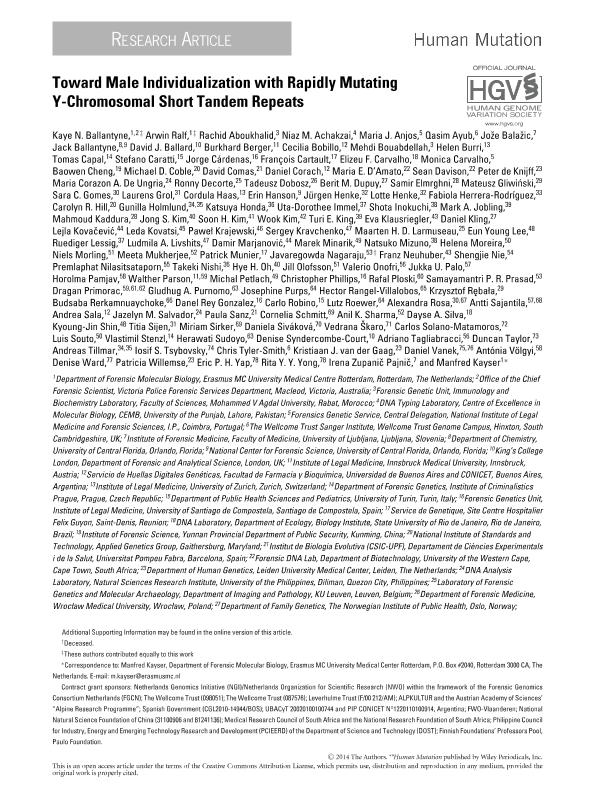Artículo
Toward Male Individualization with Rapidly Mutating Y-Chromosomal Short Tandem Repeats
Ballantyne, Kaye N.; Ralf, Arwin; Aboukhalid, Rachid ; Achakzai, Niaz M.
; Achakzai, Niaz M. ; Anjos, Maria J.; Bobillo, Maria Cecilia
; Anjos, Maria J.; Bobillo, Maria Cecilia ; Daniel Corach; Sala, Adriana Andrea
; Daniel Corach; Sala, Adriana Andrea ; Sirker, Miriam; Siváková, Daniela; Škaro, Vedrana; Solano Matamoros, Carlos; Souto, Luis; Stenzl, Vlastimil; Sudoyo, Herawati; Syndercombe Court, Denise; Tagliabracci, Adriano; Taylor, Duncan; Tillmar, Andreas; Tsybovsky, Iosif S.; Tyler Smith, Chris; Gaag, Kristiaan J. van der; Vanek, Daniel; Völgyi, Antónia; Ward, Denise; Willemse, Patricia; Yap, Eric P. H.; Yong, Rita Y. Y.; Zupanič Pajnič, Irena; Kayser, Manfred
; Sirker, Miriam; Siváková, Daniela; Škaro, Vedrana; Solano Matamoros, Carlos; Souto, Luis; Stenzl, Vlastimil; Sudoyo, Herawati; Syndercombe Court, Denise; Tagliabracci, Adriano; Taylor, Duncan; Tillmar, Andreas; Tsybovsky, Iosif S.; Tyler Smith, Chris; Gaag, Kristiaan J. van der; Vanek, Daniel; Völgyi, Antónia; Ward, Denise; Willemse, Patricia; Yap, Eric P. H.; Yong, Rita Y. Y.; Zupanič Pajnič, Irena; Kayser, Manfred
 ; Achakzai, Niaz M.
; Achakzai, Niaz M. ; Anjos, Maria J.; Bobillo, Maria Cecilia
; Anjos, Maria J.; Bobillo, Maria Cecilia ; Daniel Corach; Sala, Adriana Andrea
; Daniel Corach; Sala, Adriana Andrea ; Sirker, Miriam; Siváková, Daniela; Škaro, Vedrana; Solano Matamoros, Carlos; Souto, Luis; Stenzl, Vlastimil; Sudoyo, Herawati; Syndercombe Court, Denise; Tagliabracci, Adriano; Taylor, Duncan; Tillmar, Andreas; Tsybovsky, Iosif S.; Tyler Smith, Chris; Gaag, Kristiaan J. van der; Vanek, Daniel; Völgyi, Antónia; Ward, Denise; Willemse, Patricia; Yap, Eric P. H.; Yong, Rita Y. Y.; Zupanič Pajnič, Irena; Kayser, Manfred
; Sirker, Miriam; Siváková, Daniela; Škaro, Vedrana; Solano Matamoros, Carlos; Souto, Luis; Stenzl, Vlastimil; Sudoyo, Herawati; Syndercombe Court, Denise; Tagliabracci, Adriano; Taylor, Duncan; Tillmar, Andreas; Tsybovsky, Iosif S.; Tyler Smith, Chris; Gaag, Kristiaan J. van der; Vanek, Daniel; Völgyi, Antónia; Ward, Denise; Willemse, Patricia; Yap, Eric P. H.; Yong, Rita Y. Y.; Zupanič Pajnič, Irena; Kayser, Manfred
Fecha de publicación:
07/2014
Editorial:
Wiley
Revista:
Human Mutation
ISSN:
1059-7794
Idioma:
Inglés
Tipo de recurso:
Artículo publicado
Clasificación temática:
Resumen
Relevant for various areas of human genetics, Y-chromosomal short tandem repeats (Y-STRs) are commonly used for testing close paternal relationships among individuals and populations, and for male lineage identification. However, even the widely used 17-loci Yfiler set cannot resolve individuals and populations completely. Here, 52 centers generated quality-controlled data of 13 rapidly mutating (RM) Y-STRs in 14,644 related and unrelated males from 111 worldwide populations. Strikingly, >99% of the 12,272 unrelated males were completely individualized. Haplotype diversity was extremely high (global: 0.9999985, regional: 0.99836–0.9999988). Haplotype sharing between populations was almost absent except for six (0.05%) of the 12,156 haplotypes. Haplotype sharing within populations was generally rare (0.8% nonunique haplotypes), significantly lower in urban (0.9%) than rural (2.1%) and highest in endogamous groups (14.3%). Analysis of molecular variance revealed 99.98% of variation within populations, 0.018% among populations within groups, and 0.002% among groups. Of the 2,372 newly and 156 previously typed male relative pairs, 29% were differentiated including 27% of the 2,378 father–son pairs. Relative to Yfiler, haplotype diversity was increased in 86% of the populations tested and overall male relative differentiation was raised by 23.5%. Our study demonstrates the value of RM Y-STRs in identifying and separating unrelated and related males and provides a reference database.
Palabras clave:
Y-Str
,
Rapid Mutation
Archivos asociados
Licencia
Identificadores
Colecciones
Articulos(OCA HOUSSAY)
Articulos de OFICINA DE COORDINACION ADMINISTRATIVA HOUSSAY
Articulos de OFICINA DE COORDINACION ADMINISTRATIVA HOUSSAY
Citación
Ballantyne, Kaye N.; Ralf, Arwin; Aboukhalid, Rachid; Achakzai, Niaz M.; Anjos, Maria J.; et al.; Toward Male Individualization with Rapidly Mutating Y-Chromosomal Short Tandem Repeats; Wiley; Human Mutation; 35; 8; 7-2014; 1021-1032
Compartir
Altmétricas



